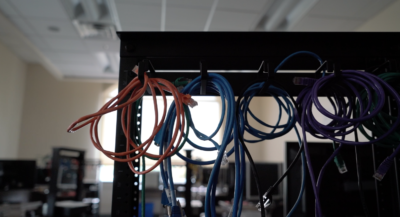

The last two years have brought great challenges to our nation’s health care, government, supply chain, and other systems we’ve taken for granted for decades. While the pandemic and its related economic impacts are surely profound, the greatest threat to our way of life can be found in the cyber domain – nefarious actors seeking to sow misinformation, steal our intellectual property, trick us out of money, and hold our information systems hostage for ransom to erode our trust in the systems and institutions serving the foundations of our republic. Our national security is at stake.
A key element of our national and local defense against cyberthreats is investments in the human talent, technologies, and services needed by public and private sector institutions to build and maintain a resilient ecosystem.
Nationally, we need an additional 1.5+ million trained individuals to fill current open cybersecurity positions. In North Carolina, we’re short an estimated 21,000. In 2020, Fayetteville Technical Community College (FTCC) and the Carolina Cyber Center (C3) at Montreat College partnered to initiate a comprehensive talent pipeline designed to protect our future by strengthening the state’s cybersecurity capabilities through a coordinated, work-ready talent development system called the Carolina Cyber Network (CCN). The General Assembly recognized the need, the innovative solution, and the ability to execute, and proceeded to fund the first phase of the initiative. Work is underway to establish a sustainable network of two- and four-year institutions dedicated to developing a sufficient pool of talent focused on the technical, professional, and essential life skills for successful careers in cybersecurity.
CCN has grown to include a total of 11 two- and four-year colleges and universities that have joined together to address the state’s growing cybersecurity workforce gap. CCN represents a holistic effort among higher education, K-12 schools, public agencies, and private enterprise to improve our response to cybersecurity threats by fortifying existing assets and growing new capabilities to protect the financial and intellectual property of North Carolina’s economy, and thereby foster economic growth and vitality.
During the initial phase of work, CCN was able to recruit and assist nine member institutions: Blue Ridge Community College, Gaston College, Catawba Valley Community College, Richmond Community College, Stanly Community College, Forsyth Technical Community College, Wayne Community College, NC A&T University, and Elizabeth City State University. CCN provided financial assistance to its member institutions to help establish or improve cybersecurity education programs in ways unique to each institution while avoiding unnecessary duplication of competency development. Member institutions were given aid and funds for internal program assessments and curriculum mapping, thus allowing members to define needs to enhance and grow internal capabilities and align student learning outcomes with the National Initiative for Cybersecurity Education (NICE) Framework to pursue the Center for Academic Excellence (CAE) designation by the National Security Agency. In addition to defining core objectives for each college aligned to the CCN mission, member institutions started developing sector-specific workgroups representing critical foci: agriculture, biotechnology, financial services, health care, military support, manufacturing, core infrastructure, and K-12 programs.
Thanks to additional funds from the General Assembly, CCN will expand its footprint over the next two years. The 2021-23 budget included an appropriation of $11 million for the development of the second and third phases of the network’s strategic plan.
In the first phase, CCN identified and invested in technical resources to be shared across the network to enable member institutions to advance educational opportunities (like topics specific to an economic sector such as agriculture or manufacturing) and to incorporate state-of-the-art, hands-on experiences that enable students to gain work-ready experiences solving “real-world” problems. For example, CCN has invested in cyber ranges and virtual lab capabilities that extend teaching and learning applications to a broader geographic area in a cost-effective manner. Many of these capabilities are expensive and thus cost prohibitive for individual colleges and schools — especially small, rural colleges and K-12 schools.
CCN is also working with K-12 partners to build capacity with school districts to deliver engaging and relevant cybersecurity education programs in K-12 institutions across the state to increase awareness of cybersecurity as a viable career pathway.
CCN has also contracted with a national firm, the Center for Regional Economic Competitiveness, to complete a workforce study defining the core knowledge, skills, and abilities needed in North Carolina. In partnership with private businesses, C3 and FTCC continue to work toward building and running accelerated talent development academies focused on creating the foundational skills and associated certifications identified by businesses for entry-level employment.
C3 is also researching and designing innovative curricula to address technical and essential life skills missing from existing cybersecurity education and training programs. Our goal is to help to build a more diverse talent pool by building a new, more inclusive curriculum designed to reach and serve adult learners that have some college credits but no degrees or have high school diplomas or less.
Thanks to the additional $11 million investment appropriated by the General Assembly in the biennial budget, CCN will undertake the following:
- Enhance and expand the network by increasing the number of member colleges that become CAE-designated institutions, recruit additional member colleges, use the National Institute of Standards and Technology-NICE Framework to align educational programs to economic sectors, and make available an online inventory of NC cybersecurity skill requirements by sector and prosperity zone;
- Develop educational resources that incorporate essential life skills, align cybersecurity curriculum with industry needs, build a Security Services Center to facilitate work-based learning for students, and develop a process for deploying shared resources across member colleges;
- Improve K-12 cybersecurity education and awareness of cybersecurity as a career;
- Develop external partnerships that establish pathways from middle to high school and align to higher education programs and employment opportunities, and strengthen connections to key industry sectors; and
- Monitor and evaluate key performance indicators and return on investment.
CCN’s vision is to build a sustainable network of two- and four-year colleges and universities supporting a holistic talent pipeline consisting of multiple entry and exit points from education to employment focused on the growing and emerging talent needs public and private enterprise. Our economic and national security interests are at stake. This is the defining endeavor of our generation.




